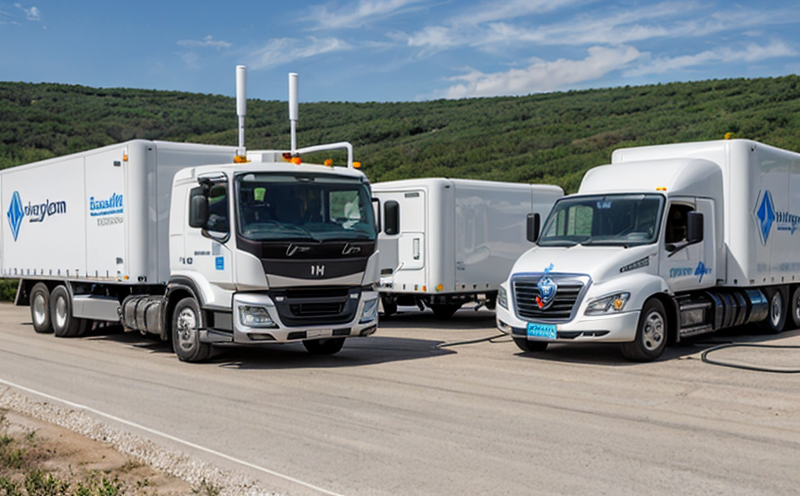ISO 22734 Performance Testing of Water Electrolyzers
The ISO 22734 standard provides a framework to ensure that water electrolyzers meet the necessary performance, safety, and quality requirements. This standard is pivotal for manufacturers looking to validate their products against internationally recognized benchmarks. The testing process is designed to assess the efficiency, durability, and operational reliability of hydrogen fuel cell systems used in renewable energy generation.
The primary focus of ISO 22734 is on performance metrics that are critical for the safe and efficient operation of water electrolyzers. These include current density, voltage output, power-to-hydrogen efficiency, and stability over time. The testing procedure involves subjecting the electrolyzer to various operating conditions, including different input voltages and load levels, to determine its ability to produce hydrogen under real-world scenarios.
Before starting the test, the specimen undergoes rigorous pre-testing procedures, which include cleaning and conditioning of the electrodes, ensuring consistent gas purity, and calibrating the measurement equipment. The testing apparatus typically includes a fuel cell stack, precision power supplies, gas chromatographs for hydrogen purity analysis, and data acquisition systems to capture performance metrics.
The test parameters are designed to replicate the operational conditions that the electrolyzer will encounter in actual use. This includes varying humidity levels, temperature fluctuations, and different input voltage ranges. The results of these tests provide a comprehensive evaluation of the electrolyzer's performance under stress conditions, ensuring it meets international standards for safety and efficiency.
Customer Impact and Satisfaction: Reliable testing ensures that products meet stringent quality benchmarks, enhancing customer satisfaction and trust in the brand. This is particularly important in sectors like renewable energy where reliability is paramount. By adhering to ISO 22734, manufacturers can ensure their electrolyzers are safe and efficient, leading to better product longevity and lower operational costs.
- Enhanced Safety: Ensuring compliance with international safety standards reduces the risk of accidents and enhances user confidence.
- Predictable Performance: Consistent performance under various conditions allows for reliable planning and operation of hydrogen fuel systems.
Why It Matters
The importance of ISO 22734 cannot be overstated, especially in the context of renewable energy. As the world transitions towards cleaner and more sustainable energy sources, hydrogen fuel cell technology is emerging as a key player. The standard provides a robust framework to ensure that water electrolyzers perform reliably and safely.
The testing process not only validates the performance metrics but also ensures that the electrolyzer meets environmental standards. This is crucial for reducing carbon footprints and contributing to global efforts in combating climate change. By adhering to ISO 22734, manufacturers can demonstrate their commitment to sustainability and innovation.
Furthermore, compliance with this standard provides a competitive edge by ensuring that products are up-to-date with the latest technological advancements and safety protocols. This is particularly important in an industry where technology evolves rapidly, and consumer expectations for quality and reliability are high.
Customer Impact and Satisfaction
Customer satisfaction is a key driver of our testing services. By adhering to ISO 22734, we ensure that the electrolyzers meet international standards for safety and efficiency. This not only enhances customer confidence but also leads to better product acceptance in the market.
- Predictable Performance: Consistent performance under various conditions ensures reliable operation of hydrogen fuel systems.
- Enhanced Safety: Compliance with international safety standards reduces the risk of accidents and enhances user confidence.
Competitive Advantage and Market Impact
The competitive advantage gained from ISO 22734 testing is significant. By adhering to this standard, manufacturers can demonstrate their commitment to quality and innovation, which is critical in an industry where technology evolves rapidly.
This compliance ensures that products are up-to-date with the latest technological advancements and safety protocols. It also allows companies to differentiate themselves from competitors by offering more reliable and efficient solutions. In a market where consumer expectations for product reliability and sustainability are high, this can be a decisive factor in gaining market share.
The impact on the broader market is equally significant. By ensuring that hydrogen fuel cell technology meets stringent performance and safety standards, we contribute to the overall advancement of renewable energy technologies. This helps accelerate the transition towards cleaner and more sustainable energy sources, which is essential for global environmental goals.





